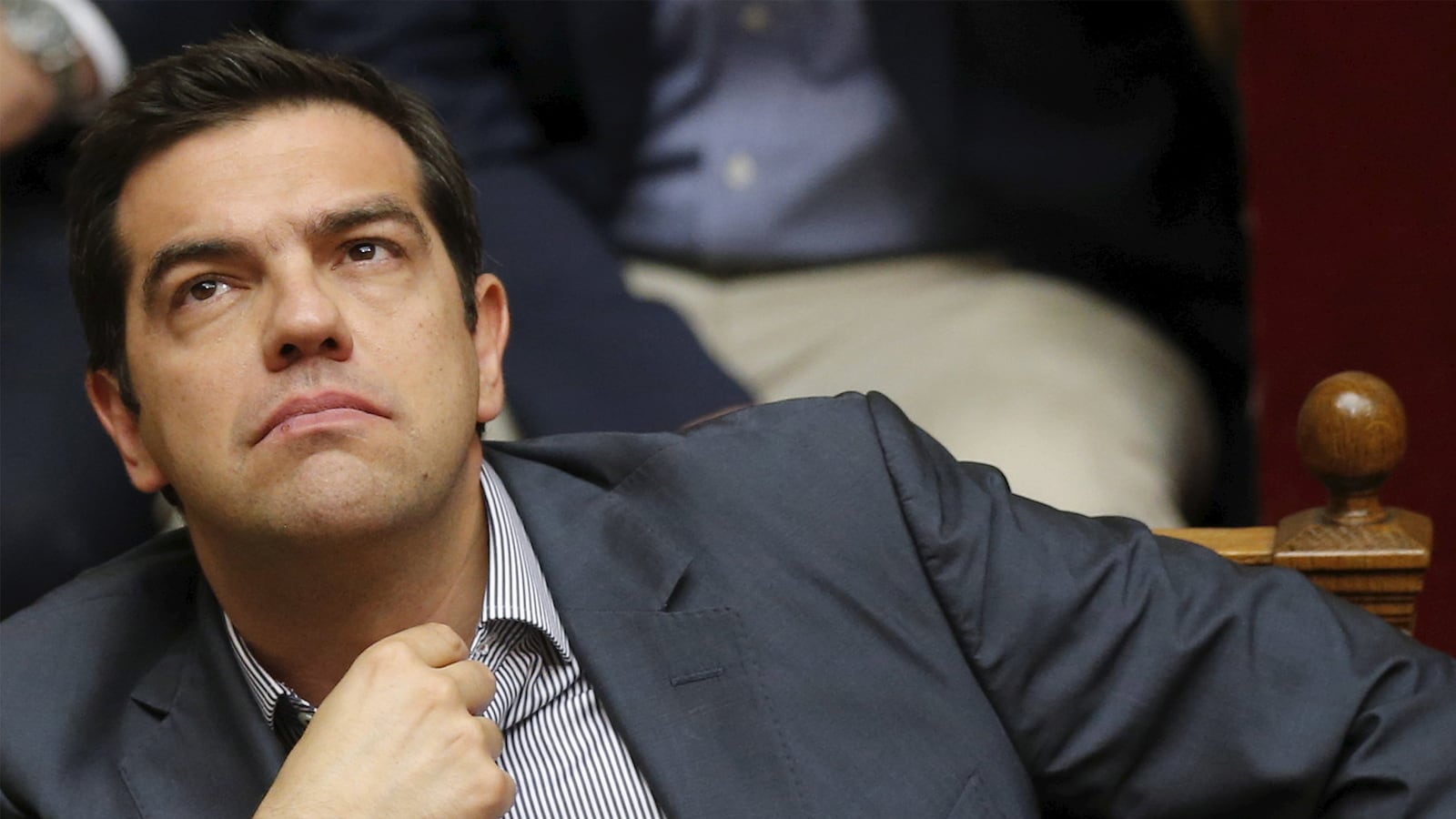ATHENS — You have to pay to ride the Athens subway again. The ticket machines that last week had paper notices stuck to them announcing free rides for everyone have disappeared. Once more tickets booths are manned. It is perhaps a sign of the surreal nature of Greece’s crisis that as the possibility of resolution nears, Greeks are forced to increase their expenditure. With improvement comes cost: It could be a motto for the crisis itself.
For the last week, as the Greek government closed its banks and limited cash withdrawals, Athenians enjoyed free public transport by way of recompense. It was, admittedly, little consolation for the threat of possible financial apocalypse. On July 6, Greeks had comprehensively rejected austerity; a standoff—possibly a fatal one for the country—seemed set to follow.
But then the strangest thing happened. Greek Prime Minister Alexis Tsipras—despite the backing his countrymen gave him to take a firmer stand against EU-imposed austerity measures—made what must be one of the most bizarre U-turns in modern political history.
Late last week Tsipras, it seems, finally realized the catastrophic toll a Greek exit from the Eurozone would take on his country and put his name to a package of proposals to be offered to Greece’s creditors that included massive climbdowns on many of his previous “red lines.” Issues such as the raising of corporate taxes, value-added taxes, and, critically, retirement ages as well as, just as critically, the lowering of public sector pay were all back on the table.
Facing the Greek Parliament he set out his position unequivocally. “There is no doubt that for six months now we’ve been in a war.… Now I have the feeling we’ve reached the boundary line,” he said. “From here on there is a minefield, and I don’t have the right to dismiss this or hide it from the Greek people.”
On a late-night vote on Friday, the Greek Parliament gave Tsipras the authority to negotiate on the new package when he won a substantial majority with 250 votes in favor of his proposal and only 32 against—although 17 government MPs rebelled.
Now the onus lies with Greece’s creditors. A summit called over the weekend to discuss Greece’s proposals and the possibility of giving the country a third bailout was abruptly broken off on Sunday after talks the previous day had ended with little progress. The issue seems to be one of trust. Eurogroup leader Jeroen Dijsselbloem announced that there had been an “in-depth discussion of the Greek proposals” in which “the issue of credibility and trust was discussed.”
Now everyone waits.
Athens was unusually quiet today. Even Panepistimiou Street, a large thoroughfare in the center of the city, was almost deserted. A few taxi drivers idled by the curb, gloomily waiting for business; a few backpacking tourists soaked up the sun. The jubilation of last week that subsequently turned to shock has settled into a general sense of unease. Everyone is waiting to see what happens. Everyone is waiting to see if this time next week Greece’s place in the Eurozone will be secure (for the time being at least) or if the rumble toward Grexit will finally begin.
Some Greeks are angry with Tsipras; others are pleased. Most are just generally confused.
Lefteris Skoutaris, 35, is an IT engineer who works in Luxemburg and returned to Greece to vote in the referendum in his home village in the Mani, a region in the Peloponnese in southern Greece. Skoutaris Voted Yes. And it was a simple decision: “I have lived and worked in the EU for years and it is clear to me that Greece has no future outside the European Union,” he tells me over the phone.
Skoutaris has been living abroad for eight years. He first did a degree in computer science in Luxemburg before taking a job at the European Space Agency in Germany. He then returned to Luxemburg, where he did research at the university there. Now he is trapped. “I would like to come back to Greece but the crisis means that I can’t,” he tells me. “But it remains a goal.”
Given his extensive European experience the choice for Skoutaris was clear. “For me the referendum was about whether we take the decision to become more responsible, to work harder, or whether we become Africa. This was the real question that Tsipras brought to the people. The question itself was totally false: We have to take measures to remedy the situation; this is inescapable if we are to build to a viable state.”
I asked him if he was surprised at Tsipras’ U-turn. “I really have no idea what to think,” he replies. “But it seems that so much pressure was brought to bear on him that he finally realized what would actually happen in the event of a Grexit. I think the fact that the banks had to close gave him a clearer view of the reality of things and somehow allowed him to jettison his party’s ideology—or at least its hardcore elements, because Syriza is a chaos of ideologies. The fact that the opposition parties in parliament supported his position would undoubtedly have made him feel more secure in his stance.”
“For me it’s clear: On the one hand, Tsipras could continue with his ideology and then drive the car off the cliff, or he could avert disaster. It seems that, thankfully, he took the latter option.”
What is clear is that we are living in momentous times, not just for the EU but for domestic Greek politics. As Skoutaris rightly points out, when the bill passed “it was an extraordinary moment for democracy in Greece. Almost all the political parties came together in a show of national unity. In Greece, where party ideology is so strong, this is almost unheard of.”
I ask him if he thinks there will now be a deal. “I hope so,” he replied. “I see that the Germans and the Finns are skeptical but the government has to try really hard to reach a deal—I just hope things go well. But you’d have to be a prophet to know how it will turn out.”
Skoutaris, like so many Greeks, is still trying to understand the events of the past few days. And like so many others, he ultimately puts it down to the vagaries of Greek politics—and of Tsipras and the Syriza party he leads, in particular. “Logically speaking, his behavior after the referendum doesn’t make sense, but then nothing much Tsipras has done has made much sense. He started by saying ‘I am going to change Europe,’ which was insane, but he was gripped with this illogical ideology and it seems that it has collapsed in the face of reality.”
“But this is just the first step—many more are needed,” Skoutaris concludes. “This is a crucial period for Greece. It really comes down to a simple question: Are we ready to take the required steps to become a normal European country? Greece is technically speaking a part of Europe, but in reality it’s more of an Eastern country.”
East or West? To go with Europe or to stand alone? These are the questions that now face this beleaguered country. And they are ones, which, on way or another, will be decided in the days and weeks to come.






